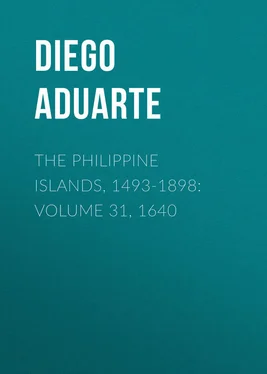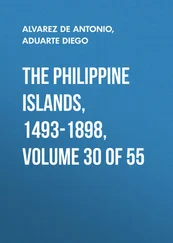Diego Aduarte - The Philippine Islands, 1493-1898 - Volume 31, 1640
Здесь есть возможность читать онлайн «Diego Aduarte - The Philippine Islands, 1493-1898 - Volume 31, 1640» — ознакомительный отрывок электронной книги совершенно бесплатно, а после прочтения отрывка купить полную версию. В некоторых случаях можно слушать аудио, скачать через торрент в формате fb2 и присутствует краткое содержание. ISBN: , Жанр: foreign_antique, foreign_prose, Историческая проза, на английском языке. Описание произведения, (предисловие) а так же отзывы посетителей доступны на портале библиотеки ЛибКат.
- Название:The Philippine Islands, 1493-1898: Volume 31, 1640
- Автор:
- Жанр:
- Год:неизвестен
- ISBN:http://www.gutenberg.org/ebooks/42399
- Рейтинг книги:5 / 5. Голосов: 1
-
Избранное:Добавить в избранное
- Отзывы:
-
Ваша оценка:
- 100
- 1
- 2
- 3
- 4
- 5
The Philippine Islands, 1493-1898: Volume 31, 1640: краткое содержание, описание и аннотация
Предлагаем к чтению аннотацию, описание, краткое содержание или предисловие (зависит от того, что написал сам автор книги «The Philippine Islands, 1493-1898: Volume 31, 1640»). Если вы не нашли необходимую информацию о книге — напишите в комментариях, мы постараемся отыскать её.
The Philippine Islands, 1493-1898: Volume 31, 1640 — читать онлайн ознакомительный отрывок
Ниже представлен текст книги, разбитый по страницам. Система сохранения места последней прочитанной страницы, позволяет с удобством читать онлайн бесплатно книгу «The Philippine Islands, 1493-1898: Volume 31, 1640», без необходимости каждый раз заново искать на чём Вы остановились. Поставьте закладку, и сможете в любой момент перейти на страницу, на которой закончили чтение.
Интервал:
Закладка:
The many virtues which this servant of God possessed were higher in degree as a result of the fire of charity which dwelt in his breast, which, as a queen of all the rest, held the highest place in his soul and governed all. He could not eat or drink in comfort without dividing with the poor; and therefore every day he set aside a part of his food, and, placing it on the corner of the table, said: “You know for whom this is” – namely, the poor, as his servants understood. This was given to them, and not only this, but other alms. That the matter might be the better attended to, they kept, by order of the bishop, a memorandum of the poor and needy of the city. He directed his servants that whenever the poor women who asked alms were Spaniards, they should indicate the fact by saying, “Here is a lady that asks alms;” if they were Indians or mestizas, they should say, “Here is a woman.” In this way, without seeing them, he would be able to tell their station, and to aid them conformably thereto. Still, when he was told about some such matter, he often went down with the servant; and, if it was the first time that she came, he used to say to her: “Come, good friend, what is the matter now? Beware not to offend God, nor to be tricked by the devil into doing any base act for need or for selfish interest. Trust in God, who will aid you; and I for my part will assist with all my heart.” In order that she might see that these were not merely good words, he used to give her some assistance and to write her name with the rest, so that he might aid her with the care required by her need, and by that of her children, if she had any. Every week he visited the prisons and the hospitals, generally assigning Fridays for that purpose. He encouraged and consoled the prisoners and the sick with kindly words and with alms, according to the need of each one. The money which he could get together from restitutions and confirmations he kept with the greatest care, that not a real might be lost; and, as if he were the most miserly man in the world, he took care of it for the poor alone, without permitting the members of his household or anyone else to take anything from the confirmations, as is customary. He used to say that this belonged to the poor, and that it was not proper that one who was not poor should share with them. From some of these alms, and from what he could add from his own poor income, he bought some lots near the Franciscan convent, and some cattle, with which he established a stock-farm, and gave it for the establishment of a hospital for the care of the natives. The hospital was built and still exists, having been very greatly increased by the care of the Franciscan fathers, who attend to it with the greatest charity. To exalt the hospital still more, the bishop obtained for it a liberal concession of plenary indulgence for the Sunday of Lazarus, 9 9 i. e. , the fifth Sunday in Lent.
as he did for the hospital of the Spaniards on Palm Sunday. So great was his charity and his desire to do good to the poor that once, when he was without money to give them, he sold his pectoral cross, which was worth one thousand eight hundred pesos, and gave it to them in alms. In the same way went his table silver; and his silver pontifical ornaments were almost always in pawn. His steward used to try to excuse himself when he was told to give alms, saying that he had not the means. The bishop, calling him to one side, would say to him, “Tell me the truth; how much money have you?” He commonly said that there was not in the house more than eight reals for the daily expense, and sometimes only four. The bishop then made him give half of what he had, saying that it was sufficient good-fortune to have some money in the house all the time, so long as the Lord would provide more; and the Lord to whom he gave took care that he should never lack, sending him what he needed for himself and for his poor from some source from which he had never expected it. When he got it, he would show it to the steward, or give it to him, and say: “Trust in God, father, and know that even if you had given me all that you had, the Lord would have sent us more.” It was a common saying among the people of his household that the Father of the poor provided money miraculously, in order that the bishop might give them alms. A person of rank was once obliged by necessity to ask alms from him. The bishop was much grieved, as this person seemed to be an honorable one; and he directed the steward to give him all the money there was in the house. As he found no more than eight reals, the bishop gave this to him, and asked the man to pardon him, saying that there was no more at that time, but that, as soon as he had any, he would be sure to come to his aid. The Lord did not delay assisting him who had not only given alms from his superfluity, but had given all that he had for the maintenance of himself and his household. For on that very night He touched the heart of a man who had laid upon him for ten years the duty of the restitution of four hundred pesos, and caused him, without waiting till morning, to embark at night and to come from Cavite to Manila; and in the morning he gave the money to the bishop without the bishop’s ever having spoken to him. The bishop had desired that his penniless condition should be cared for wholly by the Lord, who was called upon to relieve the urgent need of him who was in such need as a result of aiding the poor. When the bishop saw himself suddenly enriched with four hundred pesos, he gave thanks to the Lord, from whose hand he had received them rather than from the hand of him who had brought them hither. He instantly summoned the person to whom he had given only one peso the day before, because he had no more, and said to him: “For the little which I have given you and the much which you desired, the Lord has sent me some money. Take these fifty pesos and give me that one which I gave you yesterday; for it is that which attracted all this. Be sure that you spend well that which I give you; and, when you shall see yourself in prosperity, take care to be liberal to the poor.” The good man promised this; and in a short time God, in fulfilment of what the bishop had said to him, gave him so much money that he brought four hundred pesos, and gave them to the bishop to be distributed among the poor. The rest of what the bishop had received he did not spend on his household, though it was so poor; but published in the church that he had some money to distribute, and summoned the poor to his residence. Among them he distributed it (as he wished to) very quickly; and, showing them the eight-real piece which he had given in the first place, he said to them with much happiness and joy: “Just this peso is for me, because it is that which attracted so many.” When the bishop was at his meal, having with him at the table the first founders of this province, who had recently come to the city, a man came to beg alms. The bishop gave him a peso; and, as it seemed to the beggar too little, he showed it to the bishop, and said that he had not given him as much as he needed. This conduct appeared to those who were present bold, and even insolent; so they told the bishop that he ought to send the man away, because he had received sufficient alms, and that it was impossible at one time to succor every necessity. The bishop agreed; but before long his heart was moved to compassion at the thought that the poor man had gone away dissatisfied; and, with his eyes moist with tears, he said: “Call that poor fellow back again. His need must be very great, because it has forced him to be importunate.” The beggar came back; and the bishop, augmenting the alms so that the beggar should be contented, was contented himself, and sent him away with his blessing. Once it happened that he went to bed with fifteen pesos, which, though for persons of his dignity it was a mere nothing, for him who gave everything to the poor it was great riches; and in the morning before nine o’clock he had not a penny, because the poor had taken it all. He used to say: “The riches of bishops are in caring for the poor, who are their proper purses; and, so long as my money is not in them, they will suppose that I have appropriated it.” This did not appear only in his words, but he was so certain of the truth of it that he carried it out in practice; and it often resulted that he did not have money for the ordinary expenses of his household. He was obliged to set sail from Manila to España on important business; and one of the chief supplies which he ordered to be laid in was a provision of chickens and of conserves – things which he never tasted, and which were so foreign to his way of living that he ate nothing but fish, as if he had been in the refectory of an extremely austere convent. They got together three hundred chickens for him; but before he had left port two hundred of them were gone; while with the conserves and other things that he took he was all the time feasting and making presents to the poor and needy, so that nobody could even induce him to taste a chicken. [On the road from Mexico to San Juan de Ulua, though very ill, he charitably undertook the ordination of some candidates for the priesthood, who had been caught in a flood on their way to be ordained at Jalapa.]
Интервал:
Закладка:
Похожие книги на «The Philippine Islands, 1493-1898: Volume 31, 1640»
Представляем Вашему вниманию похожие книги на «The Philippine Islands, 1493-1898: Volume 31, 1640» списком для выбора. Мы отобрали схожую по названию и смыслу литературу в надежде предоставить читателям больше вариантов отыскать новые, интересные, ещё непрочитанные произведения.
Обсуждение, отзывы о книге «The Philippine Islands, 1493-1898: Volume 31, 1640» и просто собственные мнения читателей. Оставьте ваши комментарии, напишите, что Вы думаете о произведении, его смысле или главных героях. Укажите что конкретно понравилось, а что нет, и почему Вы так считаете.












